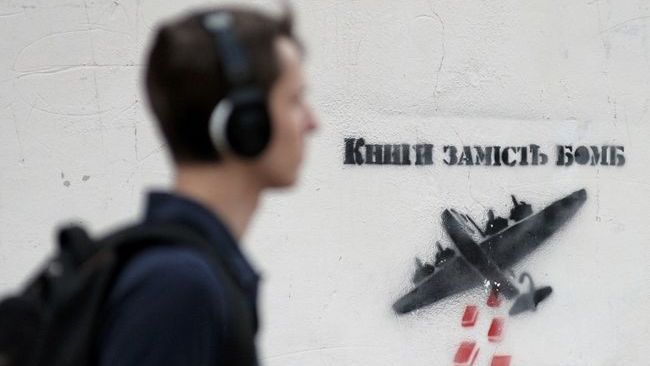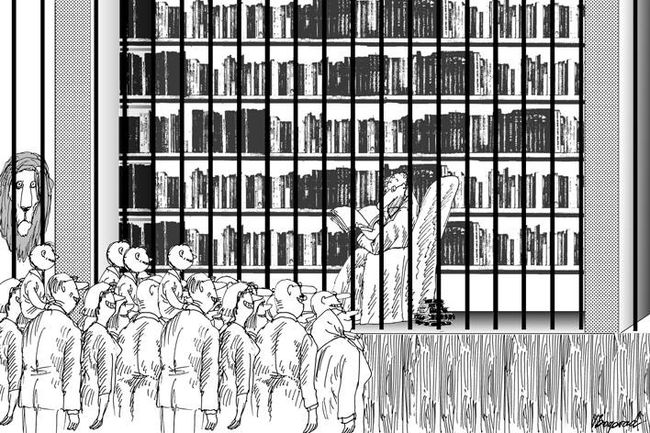History off curriculum
In the information war, Ukrainian universities leave liberal arts students no chances for a future victory
Are Ukrainian students going to study the history of Ukraine, the Ukrainian language, and philosophy as compulsory subjects? The heated debates, which this question sparked earlier this year and which The Day also spotlighted, seem to have subsided a little. Obviously, this was the result of the appeasing words of Viacheslav Kyrylenko, Ukraine’s Vice Prime Minister and Minister of Culture, who promised, after numerous addresses from academics and public outrage, to make sure that universities keep liberal arts and Ukraine-related subjects in the curriculum. “The number of [classroom] hours will be increased, not reduced,” Mr. Kyrylenko said in February. Now that it is June and a new academic year is two and a half months away, it is the right time to inquire what place these subjects will occupy in the syllabi. But, first, a few words about the prehistory.
HISTORY OF UKRAINE: A HISTORY OF BANS
The problem of the compulsory teaching of social disciplines and liberal arts first arose later past year, when the Ministry of Education and Science canceled its own instruction No. 649 of July 9, 2009. In the latter, the then minister Ivan Vakarchuk made up a list of the compulsory humanities, including the history of Ukraine, the Ukrainian language, a foreign language, the history of Ukrainian culture, and philosophy. Incidentally, that instruction was also issued under the pressure of the public and the academia. The cornerstone was, as it is today, the history of Ukraine which the minister himself had recommended shortly before to remove from the university curriculum.
Five years later, the new minister in a new government and under a new president is trying to do the same again. The ministry explains that the instruction is being cancelled in order to bring the situation into line with the July law “On Higher Education” which vests universities with the right to decide which of the disciplines are compulsory. Besides, the ministry justified its decision by saying that… it is necessity to set European education standards and that there is a low level of liberal arts teaching and, accordingly, lack of interest on the part of students. Clearly, such contradictory and groundless explanations could not but trigger an adverse reaction in society. The decision to withdraw the history of Ukraine, perhaps the only compulsory subject that is supposed to form students’ national identity, looked strange, to put it mildly – at a time when Russia is actively warping history to justify its aggression and launch a propagandistic attack against Ukraine and the world. For example, in Germany the feeling of guilt for World War Two is still mainly about Russia, although Ukraine suffered much more. By all accounts, young people “armed” with modern-day historical knowledge are supposed to spread in Ukraine and all over the world the truth about the history of Ukraine’s relations with Russia, the Kyivan Rus’ heritage, World War Two, and many other things, without the study and knowledge of which we cannot speak about a national reconciliation and a strong Ukrainian state. So, it is no wonder that the education ministry’s “innovations” have provoked a lot of letters, speeches, and press publications. One of the addresses was signed by over 240 academics and educationists from various regions of Ukraine.
THE MINISTRY OF EDUCATION GIVES BUT DOES NOT KEEP PROMISES
The government had to respond, albeit verbally. In early February, Vice Prime Minister Viacheslav Kyrylenko held a meeting attended by Serhii Kvit, Minister of Education and Science; Lilia Hrynevych, chairperson of the Parliamentary Committee for Education and Science; chiefs of educational institutions, academics, and educationists. The participants agreed in general to public demands. Summing up the discussions, Kyrylenko said at a press conference that humanitarian knowledge “is badly needed right now, when a latter-day Ukrainian identity is being shaped during the Russian aggression.” He promised that all the legal barriers, connected with the adoption of a new law on higher education and cancellation of the compulsory subjects list, would be removed by a new Education and Science Ministry instruction. In his words, the document will comprise recommendations to autonomous universities to keep intact the compulsory teaching of history, philosophy, the history of Ukrainian culture, and a number of other disciplines. To draw up a relevant decision under the ministry’s aegis, special working groups, consisting of educationists and academics, were to be formed.
In spite of the vice-premier’s promises, no ministerial instruction has ever seen the light of day. Instead, as many as five months later in March, when it was time to approve plans for the next academic year, the Ministry of Education and Science issued a three-paragraph letter of recommendation on studying the humanities. The letter said nothing about the approval of the history of Ukraine and the Ukrainian language as standard disciplines. Instead, the ministry advises universities “to ensure teaching the disciplines that form competence in the history and culture of Ukraine, philosophy, and the Ukrainian language, which require at least 12 ECTS credits if these disciplines are not core subjects.” The prerogative of choosing the forms and methods of teaching these subjects is delegated to universities themselves. They are in fact empowered to amend, combine, or “optimize” subjects at their own wish. And the total number of hours for social sciences and the humanities is almost being halved.

Sketch by Viktor BOGORAD
WHAT EXAMPLE IS SHEVCHENKO UNIVERSITY SHOWING?
It is difficult to predict how the not too patriotic administrations of universities in eastern and southern Ukraine or the education institutions where the humanities are not core subjects will use this freedom of actions. Yet they already have a “role model.” The National Taras Shevchenko University of Kyiv, by far the largest in Ukraine, decided at the end of the past year to cancel the compulsory teaching of the history of Ukraine and the Ukrainian language. With due account of the Academic Board’s recommendations, Rector Leonid Hubersky signed an instruction on 2015 teaching plans in December. In all probability, instead of the Ukraine-related studies, the baccalaureate curriculum will include such disciplines as Ukrainian and World Literature, Introduction to University Studies, and Sociopolitical Studies. Philosophy has been saved as a separate subject. “The history of Ukraine used to be taught as part of the curriculum that duplicated the school course. In this form, it evoked no keen response among both students and the faculty,” explains Ph.D. (Philosophy) Volodymyr Buhrov, the university’s Pro-Rector for Research and Education. “For this reason, we promote integration of the history of Ukraine and the Ukrainian language into professional disciplines. Every department or other academic unit will properly transform them, aided by their History School colleagues. For instance, it is ‘The History of Ukrainian Mathematics’ and ‘The History of Mathematics at the University’ for the students of mathematics or ‘The History of Science’ for sociologists.
As for the Ukrainian language, it will be taught as part of professional communication. At the same time, these subjects will be taught not in the first year of studies, as was usually the case before, but later.” In Buhrov’s view, this approach will only increase the ability of students to resist the hostile informational aggression. “The ‘coercive’ history of Ukraine course could hardly perform this function,” the educationist believes. “Instead, the question is to inculcate the skills of penetrating reading and critical thinking in students. We are trying to persuade teachers of all social sciences to teach their students to analyze propaganda on their own and make them take a civic stand and consciously defend their fatherland and Ukrainian values. I mean not only academic disciplines, but also the university’s overall ‘landscape’: sport, leisure, culture, etc.”
Aware of the importance of the disciplines in fact canceled by the ministry and the university’s Academic Board, Shevchenko University’s Institute of Journalism has decided to take an approach of its own. As the institute director Volodymyr Rizun told The Day, a subject called ‘The History of Ukraine: a Contemporary View’ will be included in the next academic year’s curriculum on his initiative. Although it will be taught optionally, students are expected to be motivated by the very fact that, from now on, a question on the history of Ukraine will be part of the final attestation program. Even this year, the Institute of Journalism’s final-year bachelor degree students took a test in the history of Ukraine and wrote a dictation in Ukrainian. “It is extremely important for the would-be journalists to know the history of Ukraine,” Rizun says. “With this in view, we have even introduced a separate specialty – ‘historical theme journalism,’ in which we have, incidentally, also cooperated with the newspaper Den. To tell the truth, it is always difficult to enroll the necessary number of students in this area, for everybody is keen on international journalism. At the same time, we are not worried about the Ukrainian language because it is widely represented in the profession-oriented subjects. I mean, in particular, orthography, voice training, stylistics, etc.” On the whole, Rizun is rather critical of the Education and Science Ministry’s initiative. “I don’t think our society is prepared for these forms of work,” he says. “Changes to curriculums should have been discussed with the professional community. Ukraine is now in a special situation – there’s a war going on. Now, on the contrary, the government should increase regulation in many fields until we drive the enemy away and Ukrainian thinking begins to dominate even in Crimea.”
We could perhaps share Rizun’s point of view. Regretfully, the time for debate has gone, for the next year’s teaching plans have already been drawn up. But what remains unanswered is which history of Ukraine Ukrainian students will study next year and what consequences this will have for this country’s national security. “We must not look like innocent sheep on which a savage neighbor has pounced,” Den’s editor-in-chief Larysa Ivshyna recently said at a meeting with Lviv Polytechnic students. “We are also to blame for our own crises. The struggle is not only for oil and gas. Russia is fighting to rob us of our place in history. History is a powerful ferment. A story rightly said to young people in a right language through the living images and generations cures and gives a great impetus.”
Newspaper output №:
№38, (2015)Section
Topic of the Day





